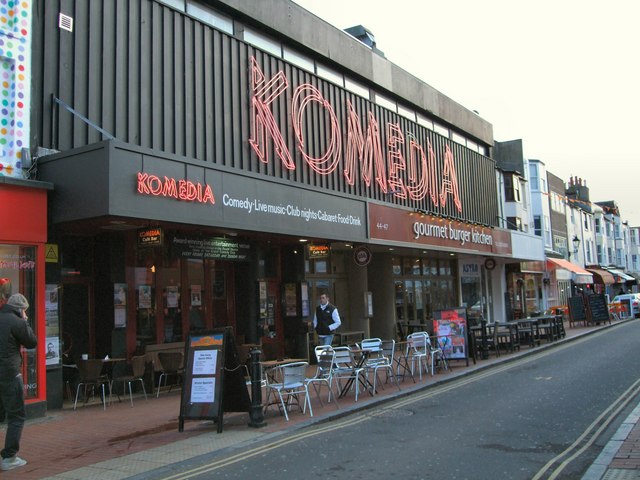Sometimes the best experiences are those you initially question. Stand Up & Slam is one such idea, for it is a resounding triumph of an evening. Hosted in the downstairs Studio 1 of Brighton’s classic comedy and culture club Komedia, the room looks more like a jazz club than a comedy-poetry crossover night, with small candle-lit tables intersecting rows of chairs, intimately packed together under low light.
Despite the seemingly low-key visual aesthetic, the event itself is social, comfortable and positively rowdy from the outset. We are introduced first to the Captain of the Comedy Team, Rich Wilson, who, alongside two other comedians, will be competing against three poets for our ultimate decision on the victorious art form. Wilson is excellent throughout the evening, fielding jokes that are upbeat, silly, and that comfortably address culturally relevant issues such as the #metoo movement, or general tropes of ‘white-man-doing-bad-stuff’ in a self-deprecating, honest way – he treads the line between comedy and seriousness perfectly.
We are then introduced to Poetry Captain, Oli Forsyth, who immediately settles in to the rhythm of the room and, alongside Wilson, plays well off of the crowd early on. Once settled in, the two do seem to resort to clearly rehearsed jokes that aren’t quite so effective. The evening seems to be at its best when Forsyth and Wilson are able to engage in more natural and spontaneous banter.
For the first half of the night, the Comedians and Poets alternate between having five minute performances each, and after each head-to-head round the audience picks winner. Although the individual performances are often sound, the strongest moments are in the time between performance segments wherein the Captains reflect on the acts before – of course, the format is necessary to allow these moments of natural comedy to thrive, as the chemistry between two hosts is fine and effortless.
With the endless banter and frequent hip hop beats punching through the intervals it has an 8-mile, boxing feel to it, and can feel a little hyper masculine, but it is friendly and good-natured, and saved by presence of two standout female performers, one poet and one comedian. Maisie Adam is a standout act, with her brand of funny, shameless, and honest relatable humour. She is wonderfully frank and enjoyable throughout her combination of prepped material and instinctual crowd-mocking.
At times, it can feel like Comedy often suits the room a little better, and it is perhaps clear that more people have come for comedy more than poetry, as the atmosphere is raucous and lively throughout. The Poetry often had the ability to silence the room with something thoughtful, which sometimes made for a tricky task for the comedians to pick up the atmosphere quickly after. Captains Wilson and Forsyth did so effectively and quickly – one of their many strengths throughout the evening.
Although the Poetry Team could be a little hit and miss, Claire Whitefield was a standout poet, with her glaring and brazen delivery. She provided an effective contrast to comedy with her own spontaneous quips here and there. Her verse was energetic and somehow instantly familiar, yet she could provide something more lasting when she chose too; the closing line of her first poem that ended ‘How Trump sleeps while lady liberty weeps’ was a particularly good example.
As the evening shifts to its second segment, all performers are brought up on stage for a theme-based section, wherein a theme is read out and each person has a minute to react to it. There are clear parallels here with Mock the Week, but the poets keep it fresh, and there is yet more back-and-forth between acts and the crowd that gets funnier as we get to know them and their context. It is often the case that the best comedy is where the concept of performance is forgotten – the space no matter how grand or small becomes the late-night pub chats or dinner-table wisecracks we know and love.
In the end, Comedy takes the night, and the bragging Wilson leaves the stage victorious, leaving Poetry Captain Forsyth to denounce his art form. This is the final success of the evening, as typically melodramatic, sad music plays, and the spotlight falls on Forsyth. He plays this moment out well in a way that is satirical and a perfect parody of the victor-loser axis in all the films and sporting narratives we know.
The whole event leaves you feeling like all the acts have been your mates for years. An outstanding evening.
Featured Image: Geograph

